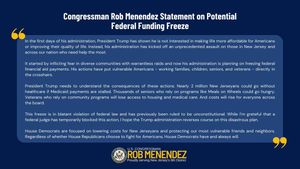Israeli Prime Minister Benjamin Netanyahu's recent trip to Washington has sparked significant interest as he engages in high-stakes discussions with U.S. President Donald Trump, particularly aimed at advancing normalization efforts with Saudi Arabia. According to Suleiman Masuade, a correspondent for Kan, sources close to Netanyahu have indicated, "We are preparing to receive tomorrow at the meeting Benjamin Netanyahu with Donald Trump, an offer to advance normalization of relations with Saudi Arabia."
The primary agenda of this visit, scheduled for February 4, 2024, revolves around facilitating peace deals amid continuing regional tensions. With Netanyahu becoming the first foreign leader to meet with Trump after his inauguration, this meeting is viewed as pivotal for both U.S.-Israel relations and broader Middle Eastern geopolitics.
Conversations are expected to touch upon various pressing issues, including the cessation of hostilities between Israel and Hamas, and the negotiations surrounding prisoner exchanges as part of the first phase of the ceasefire. Kazinform reported on Monday, February 3, 2024, the significance of discussions between Netanyahu and Trump, stating they will tackle "critically important questions facing Israel and the region — defeating Hamas, releasing all hostages, and addressing the Iranian terrorist axis."
During his transit at Ben Gurion Airport, Netanyahu expressed optimism about the meeting's potential, asserting, "Decisions we made during the war have already changed the face of the Middle East. My belief is we can reshape it even more, and for the best". This confidence signals Netanyahu’s commitment not only to addressing immediate conflicts but also to envisaging long-term shifts within the region.
South of Israel, tensions remain with Hamas, which has engaged during the ceasefire to release some hostages but continues to hold many others amid concerns of resuming violence. Netanyahu's governmental allies from the far-right have openly urged the resumption of military operations post-ceasefire phase, illustrating the internal pressures Netanyahu faces as he negotiates internationally.
On the domestic front, Finance Minister Bezalel Smotrich echoed the sentiments of caution surrounding the normalization talks with Saudi Arabia, stating, "The details...cannot be achieved simultaneously with offering hope to the PA, which supports terror." This statement highlights the nuanced views within the Israeli government on relinquishing positions to achieve broader peace agreements.
Meanwhile, the atmosphere surrounding these negotiations is pivotal, especially considering Saudi Arabia's previous hesitations to engage following the resurgence of conflict. The kingdom's stance appears firm, as it asserts being willing to open avenues for discussion primarily contingent upon the cessation of violence and genuine progress toward Palestinian statehood. Trump is known for his previous role as mediator during normalization agreements between Israel and several Arab states, and his renewed efforts now focus on similar relations with Riyadh.
While the discussions are framed to address economic and security alliances, the larger picture includes the creation of anti-Iran coalitions, which remains a strategic goal for both Israel and the U.S. The intersections of various crises — from hostages to broader diplomatic ties — make this meeting with Trump especially significant.
Expectations are running high as negotiations with Hamas progress. Early phases have seen some exchange of hostages and prisoners; four rounds have been carried out under the agreement set for six weeks. The question looms over how these delicate dynamics will shift after Netanyahu's audience with Trump, as local and international stakeholders eagerly observe.
Indeed, the engagement between the two leaders can potentially reshape alliances and alter discourse not only between Israel and its neighbors but also concerning the U.S. and its strategic interests within the region. The convergence of Netanyahu's priorities for defense and diplomacy could lead to consequential developments worthy of close attention.
The prospective outcomes of the meeting are layered with uncertainty but promise significant changes to the Middle Eastern political map. How Netanyahu navigates pressures from various factions within his cabinet and international calls for peace will set the tone for future negotiations and conflict resolution efforts. With both leaders expressing intentions to manage their nations’ interests thoroughly, the outcome could have long-lasting repercussions long after Netanyahu returns to Israel.



